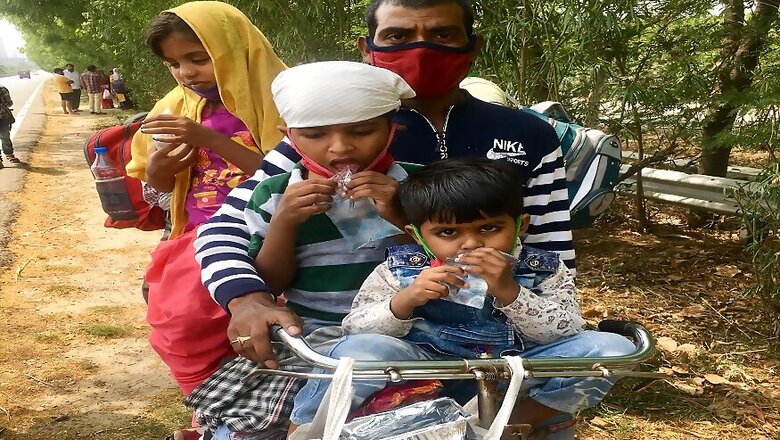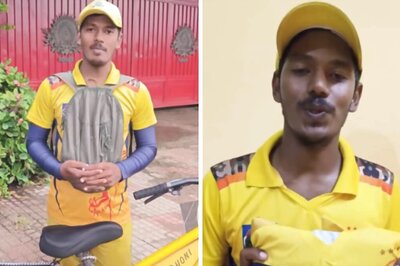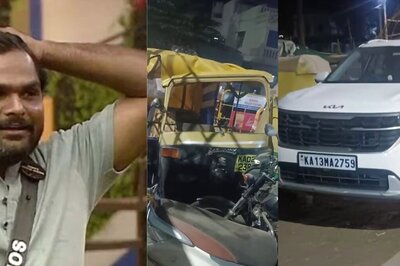
views
“Agar humein marna hi hai toh apne gaon jakar marenge. Iss sheher mein nahi marna mujhe (If we have to die, we’d rather die in our village. I don’t wish to die in this city),” says 36-year-old Kumar, as he covers his youngest son’s head with a damp cloth. It’s just past noon and 39 degree Celsius, the scorching sun feels like it will burn us on the Noida Expressway.
Kumar is riding a bicycle with his three kids seated on it. His 11-year-old daughter sits behind him, while his two sons, aged 9 and 5, are sitting in front of him on the cycle’s front seat.
They are on their way to their village in Rohtas district, Bihar. From here at Noida Expressway, it's staggering 980km away. It’s an unimaginably long journey home as they plan to ride a cycle with others who are walking alongside. They are with a group of 22 people, all daily wage earners who work in Noida and are now walking back 900 km to reach their village in Bihar.
“Kuch nahi rakha yaha humare liye ab. Ghar jaana hi theek hai,” he says. (there’s nothing left for us here. It’s better to go home). Kumar is one among lakhs of migrant workers who have decided to leave their urban shelters during the coronavirus lockdown in India. They came here with dreams and hopes and are returning home dejected, with bruises on their feet.
Much has been debated in the posh corridors of upper class India about why couldn’t they just ‘wait it out’. What was so ‘unbearable’ that they are ready to walk for hundreds of kilometers; many of them dying on the way in road and rail accidents. Some have also died of exhaustion. So we asked them, why is it that they’re walking back home.
“Ghar mein humko izzat toh milti hai. Yaha toh bachon ko khilane ke liye kuch nahi hai. Koi ration nahi milta kum logo ko. 10 parivar ko, 2 parivar ka ration de rahe hai. Agar hum uss nark mein marr bhi jaaye, kisi ka kuch nahi jaayega,” says Kumar (At least we are respected at home. There’s nothing to feed our kids here. We don’t get enough ration. 10 families are given ration that's fit for two families. Even if we die in this hell, no one would care).
“Na khana hai, na kaam hai. Aap khud hi socho Ki kitni buri halat hogi humari jo hum itni door chal kar jaa rahe hai. Bihar yaha paas mein thodi hi hai,” says Kamala, a woman in Kumar’s group. (There’s no food and no work. Imagine how hard it must be for us that we are walking so far. Bihar is not right next door)
And so they decided to walk home. They’ve packed light and are walking in groups. They stop every two hours to rest. We met them at their first stop. “Waha toh koi kuch nahi dene aata. Kam se kam, iss road par bhale log bachi, bacha ko cake, bread, biscuit toh de rahe hai,” says Kumar. (No one comes to give us anything there. At least now that we are on the road, kind-hearted people are giving cake, bread and biscuits to our children)
The government of India started special trains for migrant workers in May. These special trains called ‘Shramik’ trains run point-to-point and are arranged by state governments.
So far, the government claims 10 lakh migrant workers have been taken home in more than 800 ‘Shramik’ special trains. But the frequency of these so far is believed to be too less to ferry the sheer number of migrant workers that want to head home, across the country. Their fares have also been controversial.
Despite many states claiming that they’re paying for the ticket price, reports have shown that migrant workers in different states have had to pay basic sleeper class fare ranging between Rs 400-1,000.
Many migrants that are on the road complain of there not being enough ‘Shramik’ trains. So far, four such trains left for Bihar from the neighbouring city of New Delhi.
Bihar Chief Minister Nitish Kumar has also said his government would take care of all expenses. Yet, for Biharis like Kumar who continue to walk and cycle on highways, it is about a total lakh of faith in politicians. He says, "Sabhi raj neta sirf gareeb Ko jhasa dete hai. Unke kehne se kuch nahi hota.” (All that the politicians do is fool the poor. It doesn’t matter what they say)
Apart from ‘Shramik’ trains, which have so far been few and far in between, Railways has announced 30 special AC trains that are priced at Rs 2,000-3,500. Migrant workers tell us that that amount is completely far from reach.
“Humare paas khane ke liye 10-100 rupiya nahi hai. Train ke liye 3000-3500 kaha se laye?,” 33-year-old Deepak Pandey says. (I don’t have 10-100 rupees for food. Where will I get 3,000-3,500rs for train)
Deepak is on his way home to Gonda District, Uttar Pradesh with his 8 month pregnant wife and elderly mother. He used to work as a labourer in a small factory in Badarpur, Haryana but has not been paid anything in the past two months.
We met them at the Delhi-UP border, they had already walked for nine hours to reach there but were stopped from crossing the state border. The family has not had a proper meal since two days, not even his pregnant wife. We asked him about the free ration that’s been promised by the state governments. He alleges that only those with money have access to the ‘free’ ration. The actual poor is ‘shooed away like dogs’, he says.
“2 din se kuch nahi khaya. Bas biscuit diya tha kisi ne woh khaya hai. Ration nahi tha ghar par. Muft ka Ration sirf jiske pass paisa hai, usey mil Raha hai. Jab main ration lene jaata hu toh mujhe kutte Ki tarah bhaga dete hai,” says Deepak Pandey. (Haven’t eaten anything since two days except for biscuits that someone gave. We had no ration left at home. Free ration is only given to those with money. When I go to take ration, I am shooed away like dogs.)
“Bimari ke baare mein kaise soche jab khane ke baare mein hi sochte rehte hai.” (How can we even worry about the disease when we can’t stop thinking about our next meal)
While hunger is a good enough reason to want to leave. We still asked him if it was wise to walk 486 km more with his 8 month pregnant wife. “Raaste mein koi truck mil gaya toh baith jaayene. Nahi mila toh chalte rahenge. Ghar par bade papa hai, dost hai, khandaan hai. Woh sambhal lenge humein. Agar yaha rahe aise samay mein toh Humara hone wala Bache Ki Parwa karne wala koi nahi hai,” says Deepak. (We’ll get on a truck on the way if we find one. Otherwise, we’ll keep on walking. There’s family at home to care for us. If we stay here at such times and something happens, no one could care for my unborn child here.)
That need for family is something that’s shared by many migrant labourers we spoke to. It is one of the main factors that makes them want to return home. A safety net in that only family can provide in these dark and uncertain times. By questioning their desire to return to their families, we are stripping them off their dignity.
“Mere maa-bauji hain gaon mein,” said 43-year-old Tehsildar who has set off for Aligarh from New Delhi’s Sangam Vihar with his wife and 6-year-old daughter. They’ve already walked for over 5 hours when we met them at the Greater Noida Expressway.
Tehsildar used to sell ‘chole bhature’ in a cart and would earn Rs 300-500 a day. But the two-month-long lockdown has stopped that only source of income and has also eaten up all of their meagre savings. His wife Kumti is carrying their 6 year old daughter Dolly while Tehsildar carries a bag. They tell us that they take turns to carry Dolly as she hates to walk. “Khud toh reh lenge bina doodh chai ke. Bachi ko kaise rakhe? Bachi ko toh doodh chahiye. Kaha se laaye? Isliye ghar jaana hai,” says Kumti. (We can still live without milk and tea but how do we deprive our daughter. The child needs milk. That’s why I have to go home.)
When we asked him to wait for the government to help him. The government has announced a special package to migrant families like his, we tell him. He says, “Hum 2 machine se intezaar kar rahe hai. Aur nahi. Jinke paas khana, suraksha hota hai, wahi intezaar kar sakte hai.” (We have waited for two months, not anymore. Only those who had food and security can wait.)



















Comments
0 comment